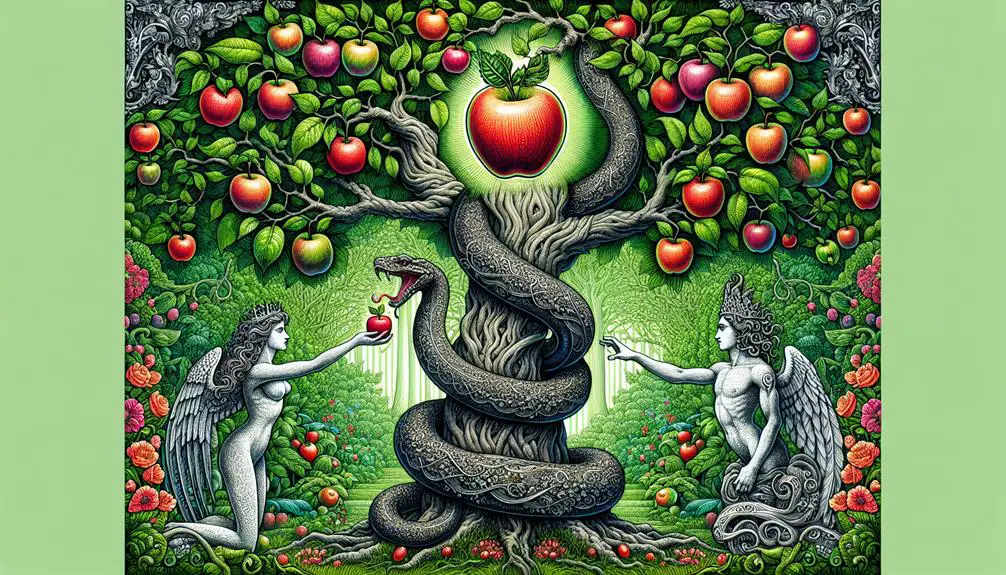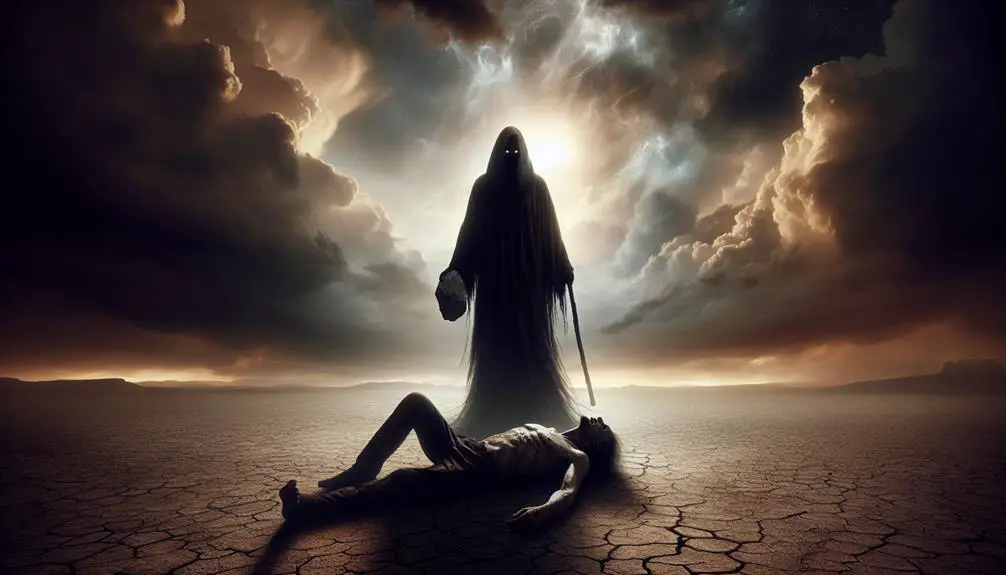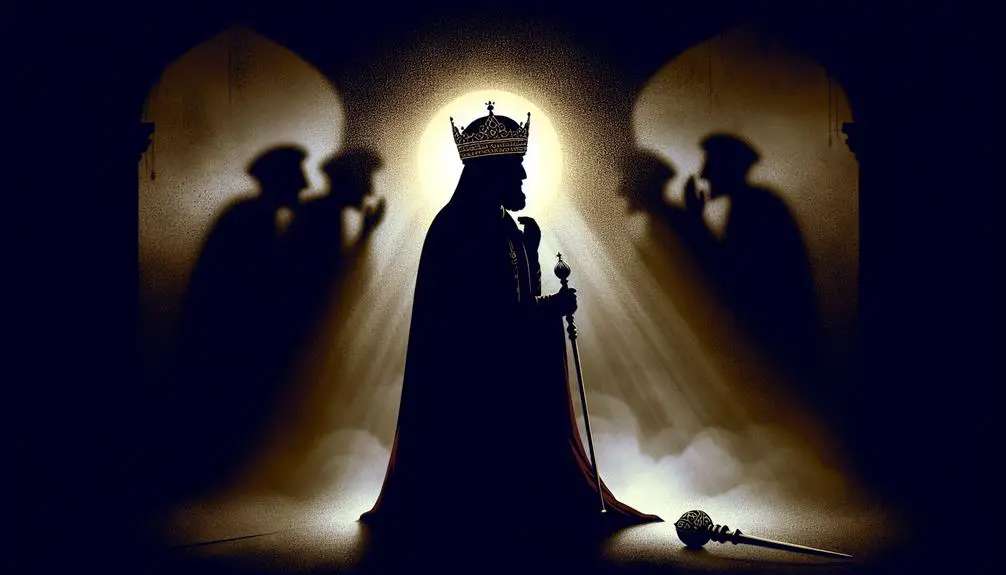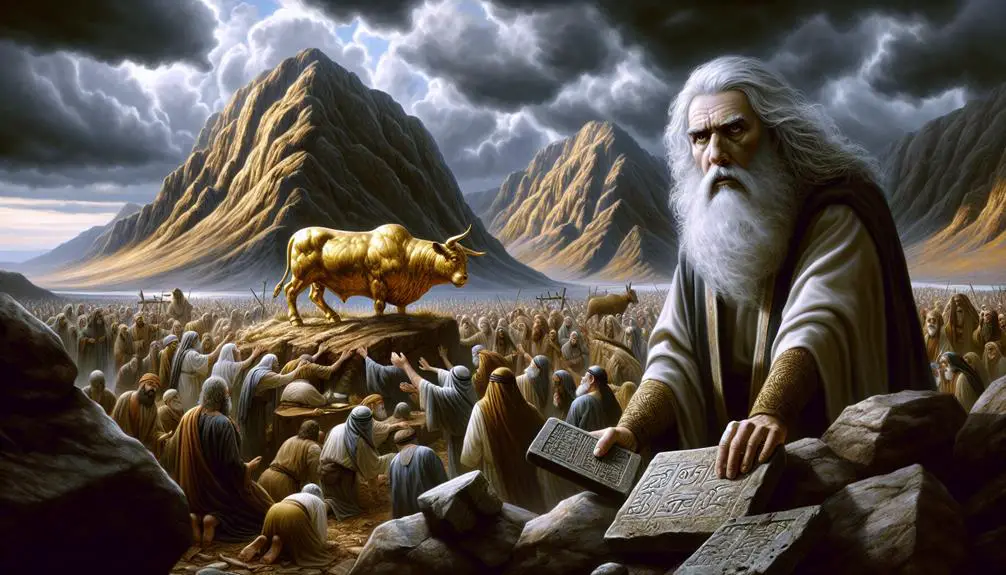Meet the biblical rebels who defied divine command, revealing lessons in faith, punishment, and the power of redemption.

Who Disobeyed God in the Bible
In the grand tradition of heavenly rule-breaking, the Bible's cast of characters didn't always stick to the divine script. You'll find that from the Garden of Eden to the tempestuous seas Jonah navigated, disobedience is as common as sand in the desert.
Adam and Eve kicked off the trend by snacking on forbidden fruit, while David added a royal scandal to the mix. Each story isn't just about defiance; it's a complex tapestry of faith, punishment, and redemption.
So, why not explore these tales further? After all, understanding their missteps could shed light on the very essence of forgiveness and grace.
Key Takeaways
- Adam and Eve initiated the pattern of disobedience by eating the forbidden fruit.
- Saul's kingship was rejected due to his failure to fully obey God's commands.
- David disobeyed God through his affair with Bathsheba and the murder of Uriah.
- The Israelites frequently disobeyed, notably by worshipping the Golden Calf.
Adam and Eve's Fall

At the dawn of humanity, Adam and Eve's decision to eat from the forbidden tree marked the first act of disobedience recorded in the Bible, setting a precedent for the complex relationship between divine commandments and human free will. This seminal event introduced the concept of original sin, a theological doctrine that has shaped Christian thought and ethics for millennia. The narrative of the forbidden fruit, as described in Genesis, encapsulates a moment of critical choice, defiance, and the ensuing consequences that ripple through time.
Your analysis of this pivotal incident must consider the symbolism of the forbidden fruit, often interpreted as the embodiment of knowledge and the temptation of curiosity that leads to disobedience. The act of eating the fruit, despite divine prohibition, underscores a fundamental aspect of human nature: the inclination towards curiosity and the desire for autonomy, even at the expense of divine harmony.
The consequences of this act, as depicted in the biblical narrative, are far-reaching. Original sin isn't merely about the transgression itself but also about the introduction of moral and existential dilemmas into the human condition. It signifies the beginning of humanity's complex relationship with the divine, characterized by a struggle between obedience to divine will and the exercise of free will.
In your exploration of this theme, it's crucial to recognize how this foundational story sets the stage for subsequent narratives of disobedience and redemption in the Bible. The concept of original sin, stemming from the consumption of the forbidden fruit, offers profound insights into the nature of human disobedience and its theological implications.
Cain's Jealous Rage

Cain's seething jealousy toward his brother Abel marks another pivotal moment of disobedience in the Bible, underscoring the destructive power of envy and the tragic consequences of allowing it to fester unchecked. This instance of sibling rivalry isn't merely a tale of personal vendetta but a profound case study in how unchecked negative emotions can lead to catastrophic outcomes. The narrative, deeply embedded in religious and moral teachings, offers a lens through which to examine the human condition and the inherent dangers of jealousy.
The crux of Cain and Abel's story revolves around their sacrificial offerings to God. Abel, a shepherd, offers the best of his flock, while Cain, a farmer, presents some crops. God's favor of Abel's offering over Cain's ignites a deadly jealousy in Cain, culminating in the premeditated murder of his brother. This act of violence is a direct disobedience to God, illustrating how envy can corrupt moral judgment and lead to the ultimate sin of fratricide.
Analyzing this narrative, it's clear that the story serves as a cautionary tale about the consequences of letting jealousy control one's actions. The sacrificial offerings symbolize not only the brothers' devotion to God but also the purity of the heart with which such offerings are made. Cain's inability to rejoice in his brother's success and his subsequent failure to control his jealousy set a precedent for the importance of mastering one's emotions to prevent sin and disobedience.
This biblical account underscores the timeless truth that unchecked jealousy can devastate relationships, highlighting the necessity of cultivating virtues like empathy, contentment, and love to counteract the corrosive effects of envy.
Noah's Generation Defiance

The era of Noah is marked by a collective defiance against divine commandments, revealing a society deeply entrenched in moral decay and disobedience. This period, as documented in biblical narratives, showcases a civilization in stark opposition to God's will, precipitating the decision to cleanse the earth through a global flood. You'll find that the ark's construction by Noah stands as a solitary act of obedience amidst widespread contempt for divine directives.
Analyzing this epoch reveals a complex interplay between divine patience and human obstinacy. God's command to Noah to build an ark in anticipation of a cataclysmic flood serves as a pivotal moment, highlighting the extent of societal corruption and the impending divine judgment. The narrative underscores a profound disregard for morality, with the majority choosing to ignore Noah's warnings, thereby sealing their fate.
The scholarly examination of this defiance provides insight into the nature of disobedience and its consequences. It's evident that the collective disregard for God's commandments didn't stem from ignorance but rather from a deliberate choice to pursue corruption. This choice led to the ultimate destruction of that generation, sparing only Noah and his family, who adhered to God's instructions.
In essence, Noah's generation's defiance serves as a cautionary tale about the repercussions of ignoring divine commandments. The global flood, a direct consequence of this defiance, highlights the severe outcomes of collective disobedience, while the ark's construction by Noah underscores the salvation available to those who choose obedience. This narrative invites reflection on the importance of adhering to moral and divine laws, emphasizing the stark contrast between obedience and defiance.
Jonah's Flight From Duty

In a stark departure from divine instruction, Jonah's decision to flee rather than fulfill his prophetic duty encapsulates another profound instance of biblical disobedience. This episode, rich in narrative detail, offers a unique lens through which to examine the intersection of maritime fears and a prophet's psychology. Jonah's attempt to escape God's command by boarding a ship to Tarshish not only underscores his reluctance but also illuminates the broader theme of human fear in the face of divine mandates.
The narrative meticulously details Jonah's maritime escape, an act driven by his profound apprehension towards the task at hand. This fear, however, isn't solely rooted in the physical dangers of his prophetic mission to Nineveh but is deeply intertwined with the psychological turmoil of potentially witnessing the city's repentance and God's subsequent mercy – outcomes that Jonah, perhaps, finds ideologically challenging or personally unsettling.
Scholarly analysis suggests that Jonah's flight is emblematic of a broader human tendency to resist divine calls, especially when they conflict with personal beliefs or fears. This resistance isn't just a physical flight but a psychological battle within Jonah, highlighting the complexities of prophetic duties and the weight of divine expectations.
Moreover, the storm that ensues upon Jonah's departure serves as a metaphor for the turmoil and chaos that often accompany attempts to evade divine responsibilities. It reflects not only the physical manifestation of maritime fears but also the internal storm within Jonah, encapsulating the tumultuous relationship between divine commands and human agency.
Jonah's flight from duty, therefore, isn't merely an act of disobedience but a profound exploration of the fears and psychological struggles that can influence one's response to divine mandates.
Saul's Rejected Kingship

Just as Jonah's flight illustrates the complexities of responding to divine calls, Saul's rejected kingship similarly reveals the consequences of failing to adhere to God's commands in positions of leadership. Saul, the first king of Israel, experienced divine rejection due to his disobedience and inability to fully commit his reign to God's will. This disobedience is starkly highlighted in his premature sacrificial offerings and his failure to completely destroy the Amalekites as commanded. These acts of defiance against divine instructions led to Saul's envy and ultimate rejection by God.
Saul's envy, particularly towards David, stems from his realization of divine favor shifting away from him. This envy exacerbated Saul's disobedience, as it clouded his judgment and led him further away from fulfilling God's commands. The narrative of Saul's reign is a poignant reminder of the importance of obedience and trust in divine guidance, especially in leadership roles.
To better understand Saul's rejected kingship, consider the following table:
Aspect |
Description |
Consequence |
|---|---|---|
Divine Command |
Complete obedience required |
Divine Rejection |
Saul's Envy |
Jealousy towards David's rising favor |
Increased disobedience |
Premature Sacrifice |
Offering sacrifices without Samuel |
Loss of divine favor |
Failure to Destroy Amalekites |
Incomplete obedience to God's command |
God rejects Saul as king |
Leadership Role |
As king, held to higher accountability |
Ultimate downfall and death |
Through Saul's story, you're reminded that leadership demands a higher standard of obedience to divine will, and the consequences of failing to uphold these standards can be severe.
David's Sin With Bathsheba

Diving into David's reign, we encounter his profound moral failing with Bathsheba, a moment that starkly contrasts his earlier victories and highlights the complexities of power and temptation. David, once celebrated for his devoutness and leadership, succumbs to desire, setting a sequence of events into motion that underscores the gravity of disobedience in the eyes of God.
To visualize David's sin and its repercussions, consider the following:
- The Sight: David, from his palace, sees Bathsheba bathing. This moment of voyeurism ignites a chain of decisions marred by lust and abuse of power.
- The Sin: David's act of adultery with Bathsheba, a clear violation of God's commandments, isn't an isolated lapse in judgment but a prelude to greater moral failure.
- Uriah's Loyalty: In a stark contrast to David's deceit, Uriah's unwavering loyalty to his comrades and kingdom, even in the face of David's manipulation, paints a picture of integrity that David himself fails to embody.
- The Confrontation: Prophet Nathan's parable serves as a divine indictment of David's actions, exposing his sin in a manner that leaves no room for denial. This confrontation is pivotal, illustrating the inevitability of truth emerging despite attempts to conceal one's wrongdoings.
This episode in David's life, particularly his attempt to hide his sin through the orchestrated death of Uriah, reveals the perilous path that even the most revered figures can tread when they stray from divine commandments. The narrative, enriched by Uriah's loyalty and the admonition of prophet Nathan, serves as a critical study on the consequences of disobedience and the possibility of redemption through repentance and accountability.
The Israelites' Idolatry

You'll find that the incident of the Golden Calf worship starkly illustrates the Israelites' proclivity for idolatry, despite clear prohibitions. This act of disobedience brought severe consequences, underscoring the gravity with which God views idolatry.
Yet, the narrative also opens a window into the dynamics of repentance and forgiveness, offering insights into the possibility of restoration even after grievous sin.
Golden Calf Worship
In examining the episode of the Golden Calf worship in the Bible, it becomes evident that this act of idolatry marked a significant breach in the Israelites' covenant with God. Under Aaron's leadership, the people demanded a tangible deity, leading to the creation of the Golden Calf. This event highlights several critical aspects:
- The Impatience of the Israelites: They quickly turned to idolatry in Moses' absence.
- Aaron's Complicity: Despite his position, Aaron yielded to the people's demands.
- The Creation of the Calf: A symbol of their departure from monotheism.
- Moses' Anger: Upon his return, Moses' reaction underscored the gravity of their betrayal.
This narrative emphasizes the fragility of faith and leadership's pivotal role in guiding or misguiding the faithful.
Consequences for Idolatry
The aftermath of the Israelites' idolatry, particularly their worship of the Golden Calf, led to severe repercussions that underscore the significance of their breach of faith. This transgression wasn't an isolated incident; it set a precedent for future acts of disobedience, including Achan's greed and the construction of Jeroboam's altars.
Achan's covetousness, as he took forbidden spoils, resulted in his death and that of his family, highlighting the dire consequences of deviating from divine directives. Similarly, Jeroboam's establishment of alternative worship sites further exemplified the Israelites' recurring lapse into idolatry, leading to the kingdom's division and eventual downfall.
These episodes collectively illustrate the profound impacts of idolatry, emphasizing the correlation between disobedience and societal decay within a theological context.
Repentance and Forgiveness
Despite the Israelites' recurring lapses into idolatry, biblical narratives consistently highlight opportunities for repentance and the possibility of divine forgiveness. This theme carries profound modern implications, stressing personal accountability and the transformative power of seeking forgiveness.
Consider the following:
- Confession: Acknowledging one's wrongdoing is the first step towards redemption.
- Contrition: A genuine sense of remorse is crucial for authentic repentance.
- Change in behavior: True repentance is evidenced by a tangible shift in actions and choices.
- Continual growth: The journey of repentance involves an ongoing process of spiritual development and self-improvement.
These elements not only underscore the importance of personal accountability but also demonstrate the enduring mercy and compassion inherent in the divine character, offering a blueprint for moral and spiritual resilience in contemporary life.
Frequently Asked Questions
How Did the Concept of Disobedience Evolve in the Bible From the Old Testament to the New Testament?
In exploring disobedience origins and Testament comparison, you'll find a fascinating evolution. Initially, the Old Testament portrays it as direct defiance against God's commands, often resulting in immediate, tangible punishments.
However, as you delve into the New Testament, disobedience is contextualized within a framework of grace and redemption. This shift highlights a more personal, relational approach to understanding and overcoming disobedience, reflecting a broader theological evolution from strict justice to encompassing mercy.
Are There Examples of Women Directly Disobeying God in the Bible, and What Were Their Consequences Compared to Men?
In the biblical narrative, women's disobedience is notably exemplified by Eve's choice and Lot's wife's defiance. Statistically, these stories highlight a gendered perspective on sin and consequence. Eve's decision to eat the forbidden fruit sets a precedent for human fallibility, contrasting with Lot's wife, whose unnamed act of looking back becomes her undoing.
Analyzing these instances reveals a complex interplay of disobedience, with women facing severe repercussions for their actions.
What Psychological Factors Are Attributed to Disobedience in Biblical Characters, According to Modern Interpretations?
Modern interpretations suggest that cognitive dissonance and moral ambiguity play significant roles in the disobedience of biblical characters.
You'll find that cognitive dissonance arises when actions conflict with beliefs, leading to uncomfortable tensions.
Moral ambiguity, on the other hand, complicates decision-making when ethical guidelines aren't clear-cut.
Scholars argue these factors contribute to disobedience, indicating a complex interplay between personal convictions and external pressures in these narratives.
How Does the Doctrine of Free Will Relate to the Acts of Disobedience Committed by Individuals in the Bible?
You're diving into how free will connects to biblical disobedience, touching the core of the determinism debate.
This doctrine suggests individuals have the autonomy to make choices, directly implicating their actions, including disobedience.
It's not just about choosing right or wrong; it's the foundation of moral responsibility.
Scholars argue this autonomy implications are crucial for understanding biblical narratives, shaping a view that disobedience isn't predestined but a result of exercising free will.
In What Ways Has the Theme of Disobedience in the Bible Been Used to Teach Moral Lessons in Contemporary Religious Education?
In contemporary religious education, the theme of disobedience is often explored through modern pedagogy, incorporating cultural influences to make lessons more relatable.
You'll find that stories of disobedience are used to highlight consequences and moral decisions, drawing parallels to today's challenges.
This approach not only makes ancient teachings accessible but also allows you to critically engage with them, fostering a deeper understanding of moral lessons within a modern context.
Conclusion
In analyzing biblical narratives, it's evident that disobedience towards God is a recurrent theme, spanning from Adam and Eve to the Israelites' idolatry. Critics might argue these stories serve merely as moral fables, yet a deeper examination reveals their complexity and the profound psychological insights they offer into human nature and the struggle between duty and desire.
Thus, these tales aren't simplistic warnings but rich texts that invite reflection on the human condition and our ethical responsibilities.



Sign up